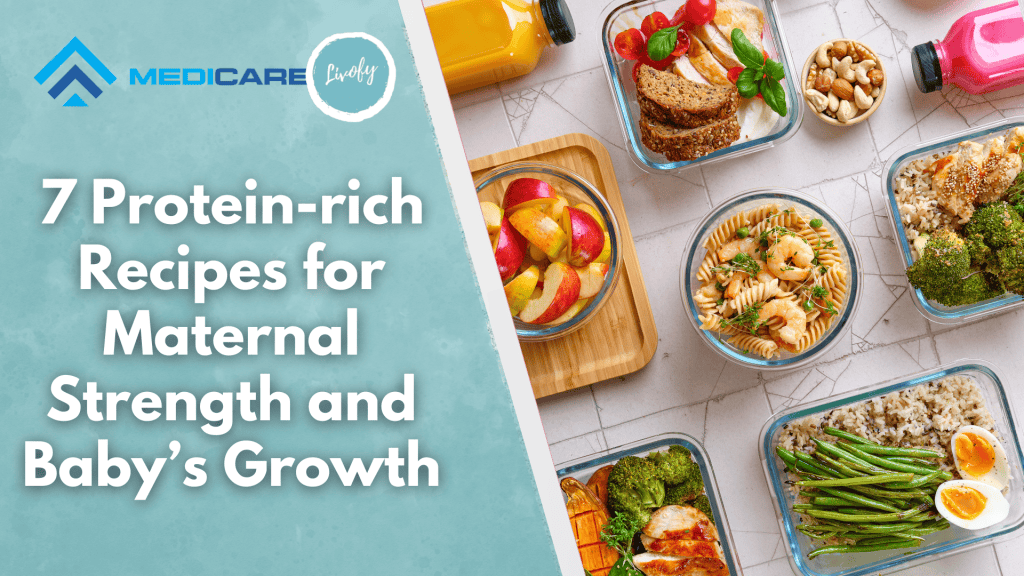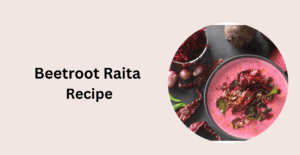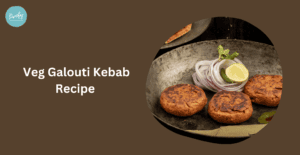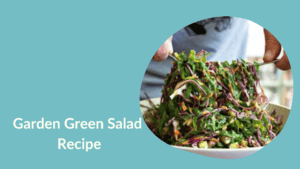A healthy diet is important during pregnancy to facilitate optimal development and growth of the baby as well as the mother. Protein, a key macronutrient, plays a crucial role in building tissues, producing hormones, and ensuring the healthy development of the fetus. Expecting mothers require more protein than usual to support these processes and maintain their strength throughout pregnancy. Continue reading to know the best protein packed recipes for maternal growth and development.
Why is protein important during Pregnancy?
Due to expansion of blood volume and growth of muscle tissues as well as with the growing fetus and placenta, the protein requirement during pregnancy increases effectively. Thus, additional protein is necessary for a healthy pregnancy. Below mentioned are some of the functions for which protein is important during pregnancy.
1. Fetal Growth and Development
Protein is fundamental for the development of the baby’s tissues and organs, including the brain. It ensures the formation of cells and is critical for overall growth.
2. Maternal Health
The increased blood supply during pregnancy requires additional protein to support muscle health and maintain energy levels.
3. Hormone and Enzyme Production
Protein aids in the production of hormones and enzymes that regulate essential body functions for both mother and baby.
4. Cell Repair
Adequate protein intake helps in cell repair, reducing pregnancy-related wear and tear, while also strengthening the immune system.
Protein-rich Recipes for Maternal Strength and Fetus Growth
Below mentioned are some of the best protein-filled recipes that will enhance mother’s well-being and baby’s growth.
1. Grilled Chicken and Quinoa Salad
This protein-rich salad combines lean grilled chicken with quinoa, a complete plant-based protein, to support muscle development and fetal growth.
Ingredients:
- Chicken breast (boneless, skinless) – 1 piece
- Quinoa (cooked) – ½ cup
- Mixed greens (spinach, arugula, lettuce) – 1 cup
- Cherry tomatoes (halved) – ½ cup
- Cucumber (diced) – ¼ cup
- Feta cheese (optional) – ¼ cup
- Olive oil – 1 tbsp
- Lemon juice – 1 tbsp
- Garlic powder – 1 tsp
- Salt and pepper to taste
How to make:
- Season the chicken breast with garlic powder, salt, and pepper. Grill it over medium heat for 5-7 minutes per side until fully cooked. Let it rest before slicing.
- Cook quinoa as per package instructions and let it cool.
- In a large bowl, combine quinoa, mixed greens, tomatoes, cucumber, and feta cheese.
- Drizzle with olive oil and lemon juice. Toss well.
- Top with sliced grilled chicken and serve.
2. Egg and Avocado Whole-Grain Wrap
Eggs are an excellent source of high-quality protein and choline, while avocados provide healthy fats essential for fetal brain development.
Ingredients:
- Eggs (large) – 2
- Avocado (mashed) – ½ piece
- Whole-grain tortilla – 1
- Spinach leaves – ¼ cup
- Greek yogurt – 1 tbsp
- Salt and Black pepper to taste
How to make:
- Scramble the eggs over low heat until fully cooked. Season with salt and pepper.
- Spread mashed avocado over the whole-grain tortilla.
- Layer with spinach leaves and scrambled eggs.
- Add a dollop of Greek yogurt, roll up the wrap, and serve.
3. Lentil and Vegetable Curry
Lentils provide plant-based protein, iron, and folate, making them perfect for boosting maternal strength and preventing anemia.
Ingredients:
- Lentils (rinsed) – 1 cup
- Onion (chopped) – 1 piece
- Garlic (minced) – 2 cloves
- Ginger (grated) – 1 inch piece
- Tomato (chopped) – 1 piece
- Carrot (diced) – 1 piece
- Bell pepper (diced) – 1 piece
- Coconut milk – ½ cup
- Turmeric – 1 tsp
- Cumin – 1 tsp
- Coriander powder – 1 tsp
- Olive oil – 1 tbsp
- Salt to taste
- Water or vegetable broth – 2 cups
How to make:
- Heat olive oil in a pot and sauté onion, garlic, and ginger until fragrant.
- Add tomatoes, turmeric, cumin, and coriander. Cook for 2 minutes.
- Stir in lentils, carrots, and bell pepper. Add water or broth. Simmer for 20-25 minutes.
- Stir in coconut milk and cook for another 5 minutes. Adjust seasoning and serve.
4. Turkey and Black Bean Chili
Turkey is a lean protein that aids muscle repair, while black beans provide additional fiber and protein for sustained energy.
Ingredients:
- Ground turkey – 1 lb
- Black beans (drained and rinsed) – 1 can (15 oz)
- Diced tomatoes – 1 can (15 oz)
- Bell pepper (chopped) – 1 piece
- Onion (chopped) – 1 small piece
- Garlic (minced) – 2 cloves
- Chili powder – 1 tsp
- Cumin – 1 tsp
- Olive oil – 1 tbsp
- Salt and Black pepper to taste
How to make:
- Heat olive oil in a pot. Sauté onion, garlic, and bell pepper.
- Add ground turkey and cook until browned.
- Stir in black beans, diced tomatoes, chili powder, cumin, salt, and pepper.
- Simmer for 15-20 minutes, stirring occasionally. Serve warm.
5. Chickpea and Spinach Stuffed Bell Peppers
Chickpeas are a great source of protein and iron, while spinach enhances folate intake, essential for fetal neural tube development.
Ingredients:
- Bell peppers (halved and deseeded) – 2 pieces
- Chickpeas (cooked) – 1 cup
- Spinach (chopped) – ½ cup
- Onion (chopped) – 1 small piece
- Garlic (minced) – 1 clove
- Cumin – ½ tsp
- Paprika – ½ tsp
- Olive oil – 1 tbsp
- Shredded cheese (optional) – ¼ cup
- Salt to taste
How to make:
- Preheat the oven to 375°F (190°C).
- Sauté onion, garlic, and spinach in olive oil until softened.
- Add chickpeas, cumin, paprika, and salt. Mash slightly to blend flavors.
- Stuff the bell pepper halves with the chickpea mixture and top with cheese if desired.
- Bake for 20-25 minutes until peppers are tender.
6. Tofu and Stir-Fried Veggie Bowl
Tofu is a fantastic plant-based protein source that also provides calcium, promoting bone health for both mother and baby.
Ingredients:
- Firm tofu (cubed) – 1 block (14 oz)
- Broccoli florets – 1 cup
- Bell peppers (sliced) – ½ cup
- Snap peas – ½ cup
- Soy sauce – 1 tbsp
- Sesame oil – 1 tbsp
- Garlic (minced) – 1 clove
- Ginger (grated) – 1 tsp
- Cornstarch – 1 tbsp
How to make:
- Toss tofu cubes with cornstarch and lightly pan-fry in sesame oil until golden brown. Remove and set aside.
- In the same pan, sauté garlic and ginger, then add vegetables. Stir-fry for 3-4 minutes.
- Add soy sauce and return the tofu to the pan. Toss everything together and serve warm.
7. Greek Yogurt Parfait with Nuts and Berries
Greek yogurt is an excellent source of protein and probiotics, which support digestion and maternal health. Nuts and seeds add extra protein and essential fatty acids.
Ingredients:
- Greek yogurt (unsweetened) – 1 cup
- Mixed nuts (almonds, walnuts, pistachios) – ¼ cup
- Mixed berries (strawberries, blueberries, raspberries) – ¼ cup
- Chia seeds – 1 tbsp
- Honey (optional) – 1 tsp
How to make:
- In a serving glass, layer Greek yogurt, mixed nuts, and berries.
- Sprinkle with chia seeds and drizzle honey if desired.
- Serve chilled and enjoy as a protein-packed snack or breakfast.
Expert Review on Protein-rich Recipes for Maternal Strength and Baby’s Growth
Dr. Amit is a certified nutritionist and he suggests that pregnant women should consume 75-100 grams of protein daily to promote fetal tissue growth, including the brain, while helping to maintain maternal muscle mass and hormonal balance. Protein is particularly vital in the second and third trimesters when fetal development accelerates. He recommends including lean meats, legumes, dairy products, tofu, and eggs as reliable sources of high-quality protein. These protein-rich recipes not only meet daily nutritional needs but also contribute to improved energy levels, reduced pregnancy fatigue, and better postpartum recovery.
FAQs
1. What are the best protein sources for pregnant women?
The best protein sources during pregnancy include lean meats, eggs, dairy like Greek yogurt, cheese, legumes such as lentils, chickpeas, tofu, quinoa, nuts, and seeds.
2. How much protein should I consume daily during pregnancy?
Experts recommend consuming 75-100 grams of protein per day during pregnancy, depending on your weight, activity level, and pregnancy stage. Consult your healthcare provider for personalized recommendations.
3. Can plant-based diets provide enough protein for pregnancy?
Yes, a plant-based diet can meet your protein needs by including a variety of legumes, tofu, tempeh, quinoa, nuts, and seeds. Combining different plant proteins ensures you receive all essential amino acids for optimal maternal and fetal health.









